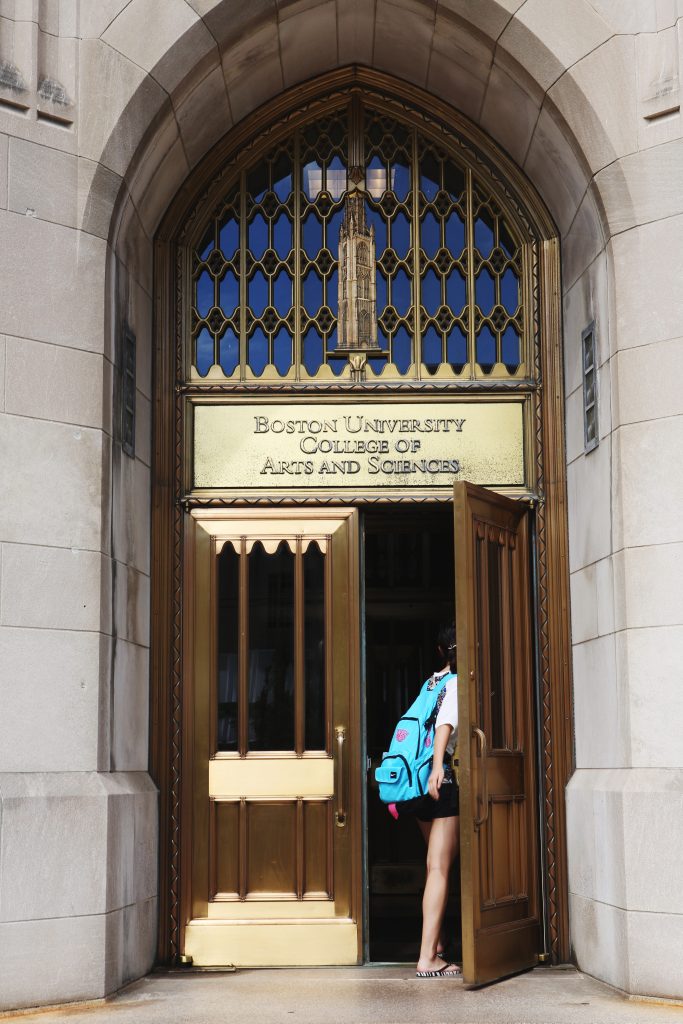 Photo by Steve Prue for Boston University Photography
Photo by Steve Prue for Boston University Photography
Advising Structures within CAS
Each department within Boston University’s College of Arts and Sciences (CAS) has a unique structure of advising its students. Different stakeholders within departments get assigned the task of advising students. It is important to keep this in mind when dealing with other students from different CAS majors. There is no one best practice for who should advise CAS students. For example, here are some common model structures below.
- Some departments only have faculty advisors for all students in their majors – no matter what year.
- Others have faculty advisors who advise the upper-level students (juniors and seniors) in their department, while an administrator advises the lower-level students (first-year and sophomores).
- Other departments have administrators advise all of their students in the major.
A common resource for all CAS students regarding advising is the CAS Advising Center (100 Bay State Rd). First-years and seniors are also automatically assigned a CAS advisor called First-Year Advisors and Graduation Advisors.
- Knowing the CAS Advising walk-in hours is imperative to refer students to if needed: weekdays 1-3:45pm.
- In addition, students can schedule an appointment with CAS Advising by logging into Handshake.
Advising Codes
Advising codes can be a tricky topic for CAS departments. CAS students need an advising code every semester to sign up for their courses for the upcoming semester. They will not be able to sign-up for courses through the BU Student Link system without them. Every semester before Registration begins, the Registrar sends each department their advising codes with a printed list for all students who should receive their code from their department. This can then be shared with faculty and staff members who advise students.
It is important to note that this list will not necessarily include all double-majors or joint majors. Students with double or joint-majors will need to see the department that comes first in the alphabet for their advising code. For example, usually joint Astronomy & Physics majors will go to the Astronomy Department for their advising codes, rather than the Physics Department.
In addition, advising codes can be looked up on the Faculty/Staff Link for individual students. An excel sheet can also be downloaded from the Link with all advising codes as well.
Advising Appointments
The format of advising appointments differs depending on the department – especially around the busy registration period, and depending on how big a department is. Here are some common practices during busy seasons of advising.
- Group Advising Before Registration
- Hosting several sessions of group advising is a best practice so students can have multiple choices to fit in their schedule. Staff members can use the Student Matrix function to view what days/times work best for their students the Faculty/Staff Link.
- TO DO THIS: Populate the list of majors by clicking “Select Student List by College,” pick the semester and name, choose “CAS” for college, then “All Programs by Hegis,” pick their major, click “Get Population,” finally, and click “Student Matrix.”
- Note: the number at each time interval notes the amount of student conflicts at that time. If you click on the number, it will tell you the class conflicts.
- With group advising, advisors can also take a look at the multiple students’ potential schedules in bulk and give out codes then.
- Separate Appointments for Registration & Other Needs
- Some large departments practice 15-30-minute advising appointment specifically for registration during peak season. If students want further advising, they might need to make another appointment to follow-up if they have other needs besides registration during peak season.
- Open Office Hours v. Scheduled Appointments
- Some departments host open office hours when a student can drop by for advising without an appointment. This is helpful to departments that might have a small load that might not have many students waiting at a time.
- Other departments use appointment slots and only book meetings with students to speak to them about advising questions so the staff or faculty member can be prepared for the meeting with all their documents and records.
- A mixture of both can also be beneficial.